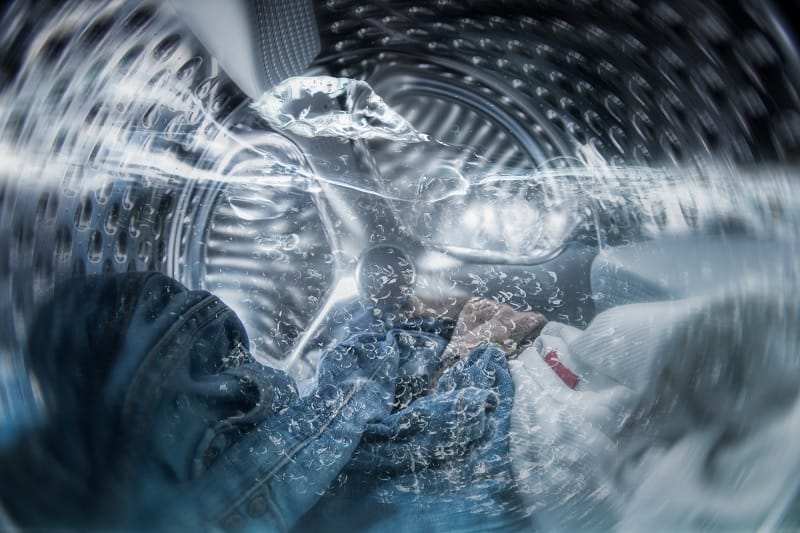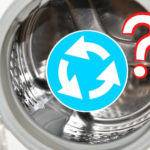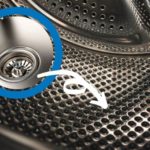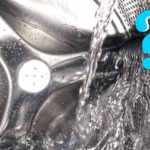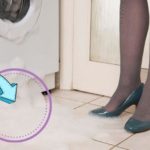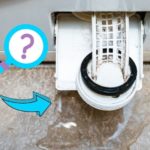Water is the most precious resource on our planet, and it’s essential for human survival. But the fresh, clean water that we need isn’t an endless resource.
We’re now using fresh water supplies faster than ever before, so it makes sense for us all to do our best to try and reduce how much water we consume in our homes.
On a personal level, saving water also saves us money. Over 60% of UK homes now have a water meter installed, where customers are billed for the amount of water used.
Even if you don’t have a water meter, you will still pay local utility charges, and the greater the demand for water, the greater the price.
How Much Water Does a Washing Machine Use?
In the past, washing machines could use a staggering 150 litres of water per cycle – that’s almost as much water as most people now use in an entire day (146 litres according to Statista).
The good news is that this has reduced significantly due to advances in technology in the last 20 years.
We looked at 54 popular washing machines on the market in the UK, and found that the average washing machine uses 48.8 litres per cycle.
See the data below:
| Model | Drum capacity (kg) | Energy rating | Litres per cycle | Litres per kg capacity |
|---|---|---|---|---|
| Hotpoint BIWMHG71483UKN | 7 | D | 49.3 | 7.0 |
| Indesit My Time EWD71453WUKN | 7 | D | 46.0 | 6.6 |
| Beko RecycledTub® WTIK76151F | 7 | C | 44.0 | 6.3 |
| Baumatic BWI147D4E | 7 | D | 44.0 | 6.3 |
| Bosch Series 4 WAN28081GB | 7 | C | 41.0 | 5.9 |
| Samsung Series 5 ecobubble™ WW70TA046TE | 7 | B | 33.6 | 4.8 |
| Hotpoint NSWM743UGGUKN | 7 | D | 45.0 | 6.4 |
| Beko WTIK72111 | 7 | C | 41.0 | 5.9 |
| Hotpoint NSWM743UBSUKN | 7 | D | 45.0 | 6.4 |
| Smeg WMI147C | 7 | E | 47.0 | 6.7 |
| Zanussi ZW74PDBI | 7 | B | 44.0 | 6.3 |
| Indesit My Time EWD81483WUKN | 8 | D | 53.8 | 6.7 |
| Hotpoint NSWA845CWWUKN | 8 | B | 48.0 | 6.0 |
| Beko WTL84121W | 8 | C | 45.0 | 5.6 |
| Haier HW80-B1439N | 8 | A | 38.2 | 4.8 |
| Hisense WFQA8014EVJMT | 8 | A | 32.0 | 4.0 |
| Hotpoint BIWMHG81484UK | 8 | C | 54.1 | 6.8 |
| Miele WSD023WCS | 8 | A | 47.0 | 5.9 |
| Hoover HBWS48D1ACE | 8 | C | 44.8 | 5.6 |
| Haier i-Pro Series 5 HW80-B14959TU1 | 8 | A | 44.0 | 5.5 |
| Candy CBW48D1E | 8 | D | 45.0 | 5.6 |
| Samsung Series 5 ecobubble™ WW90TA046AE | 9 | A | 42.7 | 4.7 |
| Hotpoint NSWA945CWWUKN | 9 | B | 50.0 | 5.6 |
| Haier Series 4 HWQ90B416FWB-UK | 9 | A | 46.0 | 5.1 |
| Samsung Series 5 ecobubble™ WW90TA046AX | 9 | A | 42.7 | 4.7 |
| Hoover H-WASH 300 H3W69TMBBE/1 | 9 | B | 46.0 | 5.1 |
| Samsung Series 5+ AddWash™ WW90T554DAN | 9 | A | 42.7 | 4.7 |
| Hotpoint BIWMHG91484UK | 9 | C | 56.1 | 6.2 |
| Hotpoint NSWM945CGGUKN | 9 | B | 53.1 | 5.9 |
| LG V3 FAV309SNE | 9 | B | 50.0 | 5.6 |
| Hoover H-WASH 300 PRO HBWOS69TAME | 9 | A | 46.0 | 5.1 |
| Beko WTL104121W | 10 | B | 57.0 | 5.7 |
| Haier HW100-B1439N | 10 | A | 45.2 | 4.5 |
| Hotpoint NM111046WDAUKN | 10 | A | 52.0 | 5.2 |
| Hisense WFQA1014EVJMT | 10 | A | 46.0 | 4.6 |
| Beko Aquatech® RecycledTub® B5W51041AW | 10 | A | 39.0 | 3.9 |
| Zanussi ZWF142F1DG | 10 | A | 53.0 | 5.3 |
| Hoover H-WASH 300 H3W4102DE | 10 | E | 58.6 | 5.9 |
| Hoover H-WASH 500 HW410AMC/1 | 10 | A | 55.0 | 5.5 |
| Indesit BWE101685XWUKN | 10 | B | 59.1 | 5.9 |
| Haier i-Pro Series 3 HW100-B14939S | 10 | A | 50.0 | 5.0 |
| Samsung Series 5 SpaceMax WW11BGA046AE | 11 | A | 54.0 | 4.9 |
| Hoover H-WASH 500 HW411AMC/1 | 11 | A | 55.9 | 5.1 |
| Hotpoint ActiveCare NLCD1164DAWUKN | 11 | C | 58.4 | 5.3 |
| Samsung Series 6+ AutoDose™ SpaceMax WW11BB534DAB | 11 | A | 54.0 | 4.9 |
| Samsung Series 8 WW11BB945DGMS1 | 11 | A | 54.0 | 4.9 |
| Whirlpool FFD11469BSVUK | 11 | A | 54.0 | 4.9 |
| LG EZDispense™ F4Y711BBTA1 | 11 | A | 54.0 | 4.9 |
| Hisense WFQA1214EVJM | 12 | A | 55.0 | 4.6 |
| LG TrueSteam™ FH4G1BCS2 | 12 | A | 50.0 | 4.2 |
| LG V7 F4V712STSE | 12 | B | 57.0 | 4.8 |
| Haier i-Pro Series 7 HW120-B14979 | 12 | A | 48.9 | 4.1 |
| Hoover H-WASH 500 HW414AMC/1 | 14 | A | 62.3 | 4.4 |
| Hoover H-WASH 500 HW412AMBCB/1 | 12 | A | 56.4 | 4.7 |
The amount of water used is related to the drum capacity. Washing machines with a small drum capacity of 7 kg, for example, tend to use less water than machines with a big 12 kg capacity.
This doesn’t mean that large machines are less efficient. In fact, large machines tend to use less water per kg of laundry washed, making them more water-efficient as you can wash more clothes with less water.
It’s also worth noting that front-loading washing machines almost always use less water than top-loading appliances. All of the washing machines we looked at were front-loading models.
Based on our data, the average washing machine water consumption is as follows:
- Average washing machine: 48.8 litres per cycle
- Average 7 kg washing machine: 43.6 litres per cycle
- Average 8 kg washing machine: 45.2 litres per cycle
- Average 9 kg washing machine: 47.5 litres per cycle
- Average 10 kg washing machine: 51.5 litres per cycle
- Average 11 kg washing machine: 54.9 litres per cycle
- Average 12 kg washing machine: 53.5 litres per cycle
- Average 14 kg washing machine: 62.3 litres per cycle
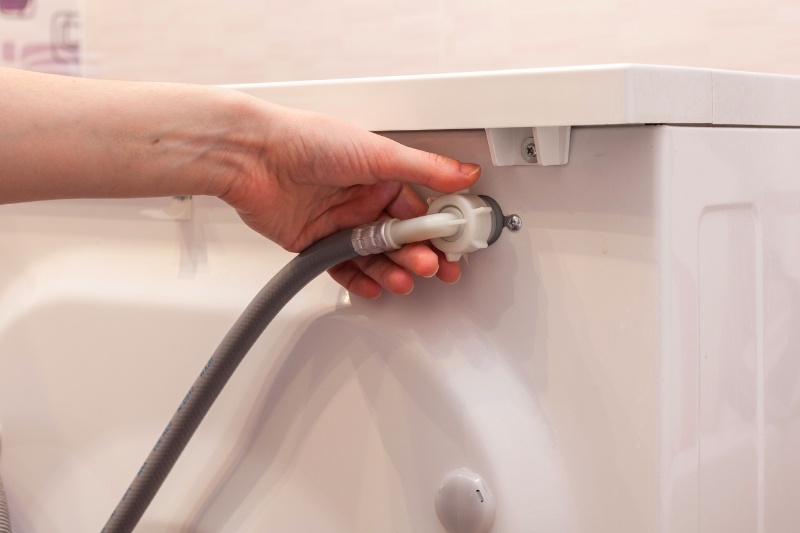
Front Loader vs Top Loader Water Usage
Most washing machines on the market in the UK are front loaders, meaning the door is on the front of the machine.
In many countries, top loaders, which have the door on the top of the machine, are more popular.
Top loaders typically use more water than front loaders. According to American appliance brand Maytag, the average top-loading washing machine with an agitator uses 19 gallons (86 litres) of water per use, while the average high-efficiency top-loading washing machine uses 13 gallons (59 litres) of water per use.
We found that the average front loader uses 48.8 litres of water per use, which is less than both a high-efficiency top loader (59 litres) and a regular top loader (86 litres).
What’s the Most Water-Efficient Washing Machine in the UK?
The most water-efficient washing machine we could find is the Beko Aquatech® RecycledTub® B5W51041AW. It has a drum capacity of 10 kg and uses just 3.9 litres of water per kg of laundry washed, working out at 39 litres in total per cycle.
The drum of this washing machine is made using recycled bottles, helping reduce its carbon footprint and make it more environmentally friendly.
While we consider the Beko B5W51041AW to be the most water efficient model due to its low water usage per kg of laundry washed, the Hisense WFQA8014EVJMT actually uses less water per cycle—just 32 litres.
However, the Hisense WFQA8014EVJMT has a smaller drum capacity (8 kg) than the Beko B5W51041AW (10 kg), so it works out as less water efficient when you consider you can’t wash as much laundry at once. It could be a good choice for smaller households who don’t need a big 10 kg drum though.
Do Energy Ratings Reflect Water Usage?
Washing machine energy ratings are based solely on electricity usage, not water usage. Therefore, machines with better energy ratings don’t necessarily use less water.
However, according to our data, better energy efficiency ratings are correlated with more efficient water usage. This makes sense, as manufacturers who invest in making machines energy efficient are likely to also invest in making them water efficient.
Furthermore, the technology used to reduce energy usage sometimes has the byproduct of reducing water usage as well.
To check whether a washing machine uses water efficiently, check the product details to find out how much water it uses per cycle.
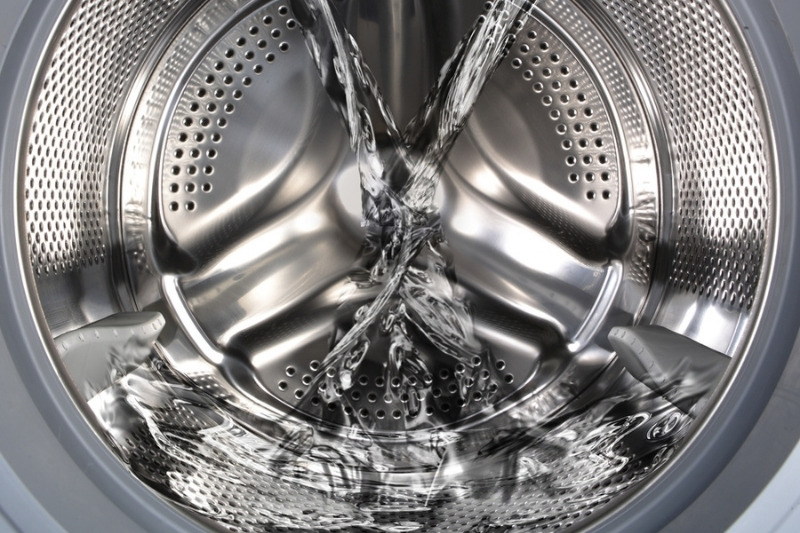
How Else Can We Save Water When Doing Our Laundry?
In addition to switching to a more efficient machine that uses less water per cycle, you can also reduce water consumption by running fuller loads each time you do your laundry.
If you do need to only wash a few items, choose a half-load setting on your machine if one is available. This will ensure that only a necessary amount of water is used. If the items can wait for a full-sized load, then this is preferable.
Using your machine less often also helps to lower water consumption, saving you money and helping the planet.
Synthetic wash cycles tend to use more water to avoid creasing, so it may be worth using cotton wash cycles as much as possible and then grabbing the iron to do some manual crease control afterwards.
Finally, avoid using the extra rinse setting unless absolutely necessary.
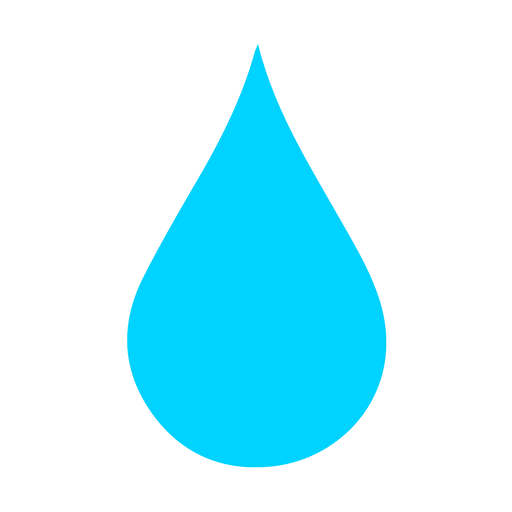
In The Wash is your guide to the best laundry and cleaning products, tips and tricks. Our mission is to solve the UK’s cleaning and laundry dilemmas!
